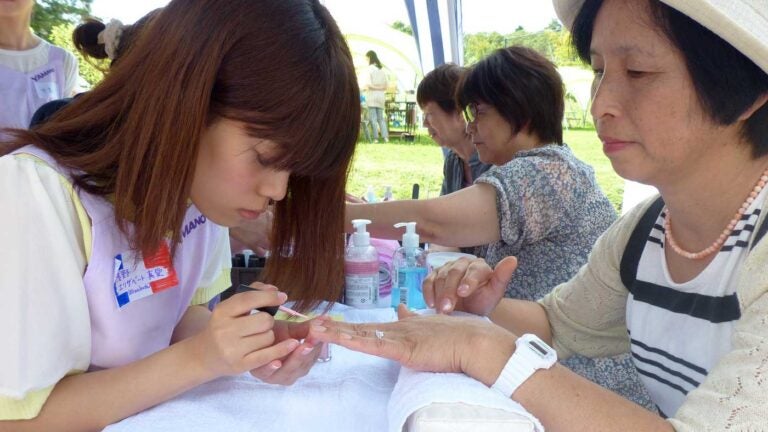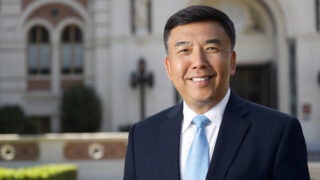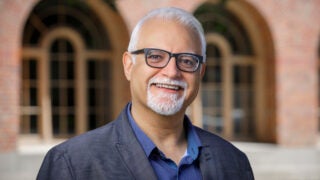
Beauticians work with the aging population at the Yamano Beauty College. The Japanese culture places a premium on service and hospitality, known as omontenashi. (Photo/Courtesy of Yamano Beauty College)
USC partners on plan to help Japan’s older population — at a beauty college
The university’s gerontology school teams with Yamano Beauty College, providing health and welfare services for aging clients
From the dramatic hairdos and makeup made famous through a centuries-old culture to the fashion-forward stylings of today, Japan has long been a world leader in beauty trends.
As part of what’s being called a super-aging society, the Yamano Beauty College in Japan is leading another movement as well.
Through a partnership with the USC Leonard Davis School of Gerontology, the college is preparing aspiring beauticians to meet the needs of Japan’s older adults. From health screenings to house calls, this collaboration recognizes the prominent role beauty school students will play in caring for aging clients in Japan, the country with the world’s oldest population.
USC Davis Dean Pinchas Cohen recently addressed nearly 1,000 students and guests about 21st-century trends in the science and study of aging. Students at the Yamano Beauty College strive to support the aging population of Japan, where more than 1 in 4 people are over 65 — and 1 in 3 are expected to be over that age by the year 2050.
Beauty is for all ages
Mike Yamano, 81, whose parents founded the Yamano beauty school in 1934, initiated the six-year-old partnership with USC Davis, a global leader in gerontology research and education. The school’s curriculum, unique for a beauty school in Japan and arguably anywhere in the world, offers a broad introduction to the health, social and economic aspects of aging in society. The Yamano Beauty College also provides a health and welfare course that includes instruction in practical matters like the operation of a wheelchair and how to wash and cut a bed-bound client’s hair.
“Nobody in Japan paid attention to the needs of older adults until we started our wellness course and our program with the USC Leonard Davis School of Gerontology,” said Yamano, an advocate for linking aging and aesthetics. “Beauty is for all ages, and I believe that when you look better, you feel better, too.”
Explanations for the importance of beauty service providers include a notion that stems from ancient Japanese beliefs that hairstyles contained magical meanings and that hair itself was somehow divine. Others cite the cultural value of a quality called omontenashi, which loosely translates to hospitality but implies a level of gratitude, service and attention that goes beyond common customer service.
Japan’s premium beauty and personal care market size exceeds $12 billion, which despite the country’s relatively small population, makes it larger than any country besides the United States, according to statistics from their Ministry of Finance.
A model for learning
Through a self-paced online course, USC delivers 60 hours of specialized training to vocational and junior college students at the Yamano College. So far, 2,600 students have taken the course, with another 400 or so soon expected to earn their certificates of completion.
We are very proud of our partnership with the Yamano Beauty College and the ways it helps prepare students to support an aging client base.
Pinchas Cohen
“We are very proud of our partnership with the Yamano Beauty College and the ways it helps prepare students to support an aging client base,” Cohen said. “Thanks to Mike Yamano’s vision, we now have a model for bringing gerontology awareness and education to service providers who are increasingly working with older adults.”
USC Davis also provides educational materials to other industries that serve growing numbers of older clients, including in areas of financial planning and home renovations. The aim is to increase awareness of aging and empathy among service providers who may already have long-term, trusted relationships with their clients.
“Through our collaboration with the Yamano Beauty College, we are arming an already-existing workforce with specialized knowledge and education that can help them provide additional support to older adults they see regularly and may know quite well,” said Maria Henke, senior associate dean at USC Davis and a key author of the custom gerontology curriculum. “We know this can apply to many other sectors as well.”
Permanent waves and a personal approach
The Yamano Beauty College was founded in 1934 by Aiko Yamano, an innovator who opened her first salon at 16 and brought the first permanent wave machine to Japan. Her husband helped set up the country’s beauty association and the rigorous national system for training and licensing students.
Today the college has more than 210,000 graduates and remains a family affair. It is now run by Jane Aiko Yamano, granddaughter of the founders and daughter of Mike Yamano, who served as chancellor before Jane. The school retains its legacy as an institution known to encourage experimentation while also honoring Japan’s past, with instruction in the Japanese cultural arts of kimono wrapping and flower arranging.
“As a result of taking the course, I now want to do a job in the future in which I can connect gerontology and cosmetology together,” said second-year student Kazuki Fujimoto.
Classmate Yuga Fujimoto agrees and looks forward to helping her older clients look and feel better.
“By learning gerontology, we can offer not only technical services, but also design and fashion suggestions,” she said.
For many older adults, that personal connection may provide the biggest boost of all.



